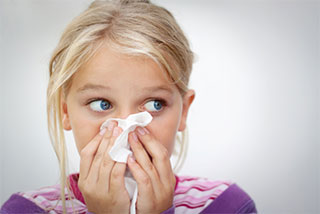 Does your child have a nagging cough? Colds and other respiratory viruses can do more than make your child feel ill. They can also impact your sick kiddo's oral health—especially if they use cough drops. Take a look at what parents need to know about dental health, childhood respiratory illnesses, cough drop use, and cavity prevention.
Does your child have a nagging cough? Colds and other respiratory viruses can do more than make your child feel ill. They can also impact your sick kiddo's oral health—especially if they use cough drops. Take a look at what parents need to know about dental health, childhood respiratory illnesses, cough drop use, and cavity prevention.
Colds, Viruses, and Dental Health
Children are especially susceptible to colds and viruses, which can disrupt their daily routines and well-being. According to the Boston Children's Hospital, kids can get between six and 10 colds each year. While parents are often focused on relieving symptoms and ensuring their children's overall health, they might not realize that these illnesses can have a significant impact on oral health too.
How can a cold affect your child's mouth health? When children have nasal congestion due to colds or viruses, they breathe through their mouths more than they usually would. This can lead to a dry mouth, reducing the production of saliva.
Saliva protects teeth against decay. Without enough saliva, your child is at risk for cavity development. The natural moisture in your child's mouth helps to rinse away leftover food and debris. It can also help to maintain the levels of calcium, fluoride, and phosphate ions that are necessary to prevent dental caries.
Not only can a cold or other respiratory illness cause dry mouth, but these types of viruses can also weaken the immune system. This makes your child more vulnerable to oral health issues, such as gum disease or tooth decay.
Cough Drops, Colds, and Your Child's Mouth Health
Cough drops are a common go-to remedy when children are suffering from coughs and sore throats. But this soothing medication can have adverse effects on dental health.
Many cough drops are filled with sugar to make them more palatable for children. The sugar in these drops can feed harmful bacteria in the mouth, leading to tooth decay. Think of cough drops as candy. Like hard candies or gummies, cough drops bathe your child's teeth in a steady stream of sugar.
The bacteria in your child's mouth thrive in a sugary environment. The more sugar there is for the bacteria to eat, the more they multiply. These bacteria can grow out of balance and excrete acids that wear away dental enamel. This can lead to cavities.
Some cough drops leave sticky residues on teeth that are challenging to remove through regular brushing. This can contribute to plaque buildup and cavity formation. This means your child will need to brush extra or pay more attention to their teeth if they use cough drops.
Along with the sugar content, cough drops are often acidic. The acidity of cough drops can erode tooth enamel. This can make teeth more susceptible to cavities and sensitivity.
Tips for Protecting Children's Dental Health
Now that you understand the potential risks, explore some tips for safeguarding your child's dental health—even when they are dealing with colds, viruses, and the occasional cough drop.
Hydration is an essential step in treating your child's cold. Encourage your child to drink water regularly, even if they have a stuffy nose. Proper hydration can help maintain saliva production and keep the mouth moist. This can decrease the risks of cavity development and help your child to recover faster.
Maintain a regular oral hygiene routine all the time—including when your child has a cold. Your child should brush their teeth at least twice a day with fluoride toothpaste and use floss to clean between teeth. This is often more challenging when your child is sick. While they may not feel like getting out of bed to brush and floss, encourage them to care for their dental health.
While proper dental care can help to brush away the leftover cough drop debris, it isn't the only way to prevent oral issues during a cold. Use moderation with cough drops. If cough drops are necessary, opt for sugar-free versions. Encourage your child to rinse their mouth with water or brush their teeth after taking them.
You can also help your child to eat a balanced diet rich in fruits, vegetables, and whole grains. These foods are not only good for overall health but also promote healthy teeth.
Regular dental check-ups can also reduce the chances of dental caries. Schedule regular dental check-ups for your child, even when they are not sick. This allows the dentist to monitor their oral health and address any issues early.
If you have concerns about the results of cough drop use, talk to the dentist during the regular check-up. The dentist can discuss ways to reduce the effects of drops and how to keep your child's mouth healthy when they are sick with a respiratory virus.
Does your child need to visit the dentist? Do you want to learn more about keeping your child's mouth healthy? Contact Dentistry for Children and Adolescents for more information on appointments and services.
